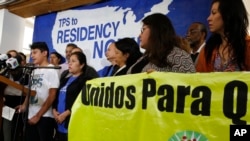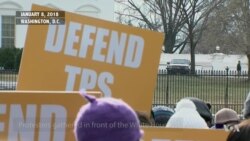More than 260,000 immigrants from El Salvador are full of anxiety and questions after the Trump administration said it was ending their authorization to stay in the country.
When their Temporary Protected Status (TPS) is revoked on September 9, 2019, many will most likely go back to being undocumented migrants and no longer be shielded from possible deportation.
Others with green cards or family-related visas may be allowed to remain in the U.S.
The Salvadorans came to the U.S. with nowhere else to go after two powerful earthquakes devastated their towns and destroyed their homes in early 2001.
The George W. Bush administration granted them TPS as an emergency relief measure.
Sufficient recovery
Officials must renew a country's TPS every 18 months. The Trump administration has determined that El Salvador has long since recovered enough from the 2001 earthquakes to allow the Salvadorans to return.
Many of the Salvadorans under TPS own their own homes and businesses, pay taxes, are raising families and have relatives in Latin America who rely on money from the U.S.
New York Governor Andrew Cuomo has ordered state officials to increase access and resources for the more than 16,000 Salvadorans living in New York state who would be affected by the end of TPS.
"The federal administration's decision to tear families apart, disrupt small businesses and lead those who have become part of the American fabric to an uncertain future is disgraceful and unjust," Cuomo said Tuesday.
Donald Kerwin, executive director of the Center for Migration Studies, told VOA the Trump administration's decision "creates nothing but losers."
"El Salvador has said they cannot safely accommodate them. A lot will be victimized if they return [to violence-plagued communities] without good economic prospects," he said.
Time for their departure
But Ira Mehlman of the Federation for American Immigration Reform said it is time for the Salvadorans to "honor their commitment" and return home. He said the process should not have gone on this long.
"We should not allow that to happen because in the long run, what it is going to do is prevent us from offering similar benefits to other nationalities in the future," Mehlman said.
The Department of Homeland Security said it had considered only the earthquake recovery and not "violence on the ground" when making its TPS determination for El Salvador.
It also delayed the end of TPS until 2019, which will give Congress time to come up with a better solution.
WATCH: U.S. to End Temporary Protection from Deportation for Salvadorans
TPS for those from Haiti, Nicaragua and Sudan because of war or natural disasters is also set to expire in 2019.
Six other nations are covered by TPS — Honduras, Nepal, Somalia, South Sudan, Syria and Yemen. Announcements concerning them are expected later this year.
VOA's Ken Bredemeier, Victor Beattie and Victoria Macchi contributed to this report.









